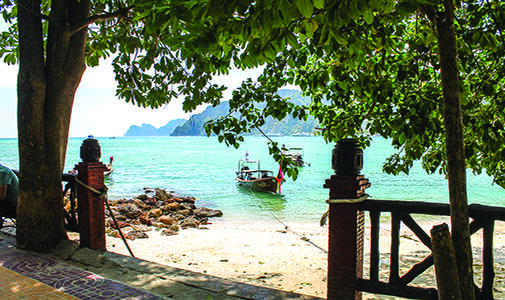Not gonna lie: I love my life.
I moved to Prague four years ago to restart my life as a freelance/contract writer for International Living and other outlets. The experience has been more than I could have initially imagined. I’ve never been happier.
In early spring this year, I was sitting in the elegant lounge of an 18th-century hotel in Karlovy Vary, an ancient Czech spa town near the German border. Late-afternoon. I was doing a bit of writing after spending the early part of the afternoon ambling between steam room, hot tub, and sauna. I’d ordered a Czech beer and, on a whim, I snapped a photo of it, the lounge as the backdrop, and posted it to my Twitter feed.
Seconds later, I was slammed with all manner of replies from people wishing they could live my life.
As a digital nomad, I get that a lot— people envious of my freedom to live and work from anywhere in the world I want to be. Or envious of the fact that I call Prague home, and that I be-bop around Europe whenever I want.
And almost all of them have the same question: How can I do this too?
It’s a question I increasingly hear from older workers like me (I’m 56). They’ve come to the realization that life in the U.S. and Canada is just too costly, and that their savings aren’t going to provide them the quality of life they want in retirement.
They’re looking to head out early, to escape the rat race they’re weary of after all these decades, and to live abroad as a digital nomad. Thing is, though, they don’t necessarily want to hop from place to place to place every three to six months, which is necessary when you’re dependent on tourist visas.
They want what I have: A long-term residency visa that allows them to remain in country for years at a time Alas, that isn’t as easy as one might hope. In recent years, particularly in the post-pandemic age, digital nomad visas have been popping up all over the planet. They started as something of a gimmick in the Caribbean, as a way to attract high-income Americans wanting to escape the lockdown in the U.S. for six months to a year. Now, they’ve spread globally. By my count—and it’s official—more than 20 countries offer digital nomad visas. You’ll find them not only in the Caribbean, but in Europe, the Middle East, and Asia. All are similar in that they allow a worker to legally live and work locally for some period of time. But they’re also quite different in that many require different levels of income to apply, provide for different periods of validity, and don’t always lead to a permanent residency option if that’s your goal.
Moreover, not all countries use this term “digital nomad visa.” Frankly, that’s just a marketing ploy. The reality is that these types of visas have been around for years—they’ve just been called exactly what they are: work visa or long-term residency visas that allow one to earn an income locally. Here in the Czech Republic, where I live and work, you apply to be on the zivnostensky list—the freelance workers’ list used by everyone from foreign writers like me to locals who work in a freelance capacity.
With that as our preamble, let’s take a look at some of the best of these visas, and the requirements necessary for obtaining them. Note that I am listing basic requirements; there are often several niggling requirements you need to fulfill as well, such a background checks, providing proof of insurance, and the like.
Czech Republic
If you like Continental weather and easy access to all of Europe, the Middle East, and North Africa, the Czech Republic is perfect. You apply to be included on the zivnostensky list I mentioned (the zivno, locally, or what’s known as a “trade license”). That in hand, you can apply for a long-term residency permit that’s good for one year, then easily renewable every two years.
Basic requirements: Proof of accommodation for at least a year; proof you have at least €5,600 (about $6,100) in your bank account; payment of local taxes for the Czech social security and healthcare systems of roughly $220 per month.
Greece
This is a new one, having arrived in summer 2021. And if you’ve ever been to Greece, you will reflexively understand why digital nomads want to be there: Sun, sand, wonderfully fresh food, and a low cost of living when you’re out on one of the many islands.
Basic requirements: Proof of monthly minimum income of €3,500 ($3,800) by way of bank documents; proof your income comes by way of remote work; proof of accommodation.
Costa Rica
Close to home for North Americans, but seemingly a world away when you’re living amid mountainous tropical forests and jungles…or along sandy beaches. But don’t expect dirt-cheap living. Costa Rica can be relatively costly. The visa is good for one year, and can be renewed. You are exempt from local income taxes (though if you’re a U.S. citizen, you will always owe Uncle Sam).
Basic requirements: Proof of $3,000 per month in income; proof of travel medical insurance that provides coverage in Costa Rica.
Germany
Germany’s Freiberufler visa, despite some paperwork headaches (this is Germany, after all) is popular among digital nomads. The country is relatively affordable, English is widely spoken, and the visa is good for up to three years. It can then be renewed, so long as all the same qualifications are met.
Basic requirements: Frankly, there are many, including: a portfolio of work; evidence of expertise in your field; proof of adequate income (though an amount is not specified); a freelance plan; letters of commitment from current/potential employers; proof of education.
Malta
Beaches galore, and a heady mix of Spanish, Italian, Greek, British, Turkish, and Arabic cultures. Malta, which sort of reminds me of Southern California, is small, easily accessible from all over Europe, and increasingly popular with digital nomads with ties to tech and crypto.
Basic requirements: Must offer freelance services to foreign clients only; minimum monthly income of at least €2,700 (about $2,950); proof of health insurance the provides coverage in Malta; proof of accommodation locally.
Mexico

Resident Visa is surprisingly affordable.
©Sean Keenan
Like Costa Rica, it’s close to home. Unlike Costa Rica, Mexico has many more types of environments and landscapes—from deserts to tropical beaches, urban sprawl to mountains cities where it’s perennially spring. And it’s quite cheap to live a high-end lifestyle. The Temporary Resident Visa is good for one year, and renewable for another three.
Basic requirements: Proof you work remotely for your own location-independent company, or remotely for a non-Mexican company; at least $1,620 per month income, or have at least $27,000 in a bank account.
Portugal
A beautiful sliver of land on the Iberian Peninsula. Portugal is a great destination for lovers of wine, food, and history… and it has a great climate. The visa for independent workers is good for one year, and renewable for as many as five years, after which you can apply for permanent residency. Better yet, the income requirements are exceptionally low.
Basic requirements: Proof of income of at least €600 per month (about $650); proof that your income derives from freelance work; proof of health insurance that covers Portugal; proof of accommodation.
Nomad visas are popping up all over the planet.
Bermuda
The Atlantic island nation recently launched its “Work from Bermuda” digital nomad visa that allows freelancers to work on the island for one year and is renewable on a case-by-case basis. You will owe no income tax to Bermuda. One caveat: Bermuda can be expensive.
Basic requirements: Proof you are a freelance worker; proof of health insurance; proof you possess “substantial means and/or have a continuous source of annual income,” though there is no set minimum income requirement. Again, Bermuda is expensive, at least double the U.S., so make sure you have adequate income.
Thailand
Thailand is in the process of building what might well be the ultimate digital nomad visa—one that lasts five years with the option to renew for another five. Most countries require you to renew your visa every year or two, which can be a bit of hassle.
Basic requirements: All largely unknown, as Thailand is still shaping the details. You will likely need to prove income from freelance sources. And it will cost 10,000 baht per year, about $300 at current exchange rates.
Other Countries
As for other countries/regions that have or are exploring digital nomad visas, the list includes: Anguilla; Antigua & Barbuda; Bali; Barbados; Cayman Islands; Croatia; Dubai; Estonia; Georgia; Hungary; Iceland; Mauritius; Norway; Spain.
If chucking your exist work life and seeking a better balance to living and earning is your goal, I cannot stress enough the Nike slogan, “Just do it!” Frankly, I wish I’d done it sooner. The contentedness I feel waking up every morning in Prague, and the financial freedom of knowing my retirement is more secure and that my wife and I can plan a trip to Croatia or Paris or Crete without much concern for cost…there’s nothing like it.
When I stop to think about this digital nomad life I live, I know why others are so envious.
The good news: This can be your life too.
 Jeff D. Opdyke is the editor of The Global Intelligence Letter, IL’s guide to personal finance and investing. Based in Prague, he spent 17 years at The Wall Street Journal and writes on personal finance and investment. Check out his free e-letter, Field Notes at IntLiving.com/FieldNotes.
Jeff D. Opdyke is the editor of The Global Intelligence Letter, IL’s guide to personal finance and investing. Based in Prague, he spent 17 years at The Wall Street Journal and writes on personal finance and investment. Check out his free e-letter, Field Notes at IntLiving.com/FieldNotes.


